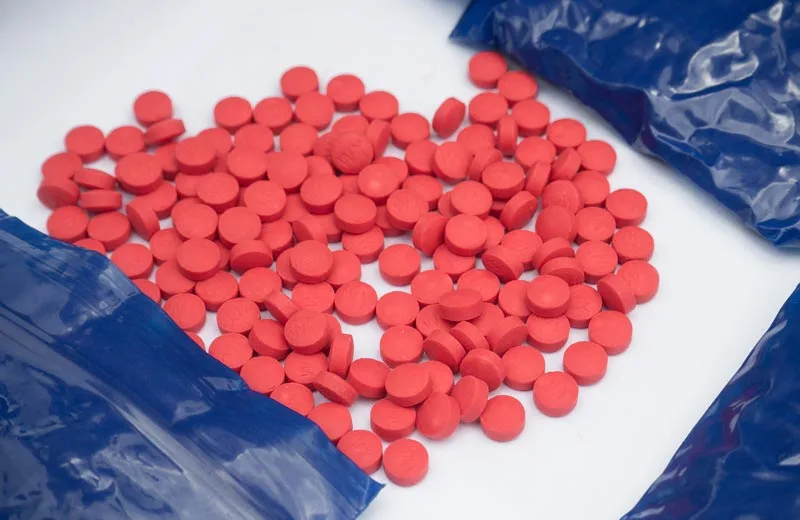Amphetamine Addiction Recovery
Many people are so caught up in the current attention being paid to methamphetamines that they forget about the original precursor to this drug. Amphetamines are still an issue and readily available for anyone looking for a quick boost or just to keep pace with our increasingly hectic lives.
This drug is commonly abused in the form of prescription pills by athletes and college students. Scholars prefer amphetamine pills because of their ability to stay up late studying and completing schoolwork.
It also enhances their focus and levels of alertness, allowing them to digest knowledge more efficiently. While it’s true that methamphetamines are running rampant and currently causing an epidemic, it’s essential not to forget about the dangers of amphetamines and the havoc they wreak on the people who struggle with their abuse.
This article will break down all the facts surrounding amphetamines and what it takes to recover from these dangerous prescription pills.
What Are Amphetamines?

Amphetamines exist as a synthetic form of adrenaline almost. They’re classified by the United States Drug Enforcement Administration (DEA) as central nervous system stimulants and shares similarities with methamphetamine or methamphetamines.
Those on amphetamines will take longer to sleep, feel more energized, experience weight loss due to forgetting to eat and the depletion of valuable vitamins and minerals, and may suffer hallucinations. Amphetamines are commonly found in prescription drugs for ADHD, weight loss, and other conditions.
Some physicians write them off-label for chronic fatigue syndrome in adults. Many people confuse amphetamines with methamphetamines, also found in prescription drugs, but more commonly make up the street substance known as crystal meth.
Amphetamines vs. Methamphetamines
One of the most challenging aspects of diagnosing amphetamine abuse is distinguishing between the two main types of the drug: amphetamines and methamphetamines. While both medications are highly addictive and can have dangerous side effects, they differ in their chemical makeup and how they affect the user.
Doctors typically prescribe amphetamines to treat attention deficit disorder (ADD) and narcolepsy. They work by increasing levels of dopamine and norepinephrine in the brain, which leads to increased alertness and energy.
Methamphetamines, on the other hand, are a more potent form of the drug that is generally produced illegally in meth labs. Methamphetamines work by causing a release of dopamine, which creates a sense of euphoria in the user.
While both drugs can help treat certain medical conditions, they also have a high risk for abuse and addiction. Amphetamines are often used as study drugs or “uppers” by college students looking to pull all-nighters, while methamphetamines are popular among people already introduced to common street drugs. The abuse of either drug can lead to serious health problems, including heart attack, heart disease, and more.
They both have similar effects and leave almost identical signs of use behind their deadly wake.
Experience True Healing
Our deeply-caring staff and the surrounding natural beauty offer an unparalleled healing experience.
What are the Common Signs of Amphetamine Use?
Although some people are good at hiding their substance abuse issues of any kind, prescription amphetamines can be one of the more hidden addictions. Identifying any substance abuse disorder can be difficult for the untrained eye, especially regular stimulant use of this kind.
It is essential to remain educated about the signs and red flags regarding the use of these drugs. One of the most common signs of amphetamine use is weight loss. This is because the drug suppresses appetite. Other common signs include:
- Increased alertness and energy
- Euphoria
- Hyperactivity
- Aggression
- Paranoia
- Grinding teeth
- “Tweaking,” or repeating the same process over and over
- Increased sexual appetite
- Constant talking
- Sweating
- Remaining awake for days at a time
- Dark circles under the eyes
People may be able to hide the signs near the beginning of their bout with abuse. However, because of the highly addictive nature of amphetamines, eventually, the power of these drugs takes hold, and the signs become more apparent.
This is one of the most common stigmas associated with amphetamines, especially for unassuming first-time users. The belief that amphetamines are not addictive lead many down a deadly path of physical and mental dependence.
Are Amphetamines Addictive?
Amphetamines are central nervous system stimulants that increase alertness, energy, and focus. These areas are highly attractive to users that many look to continue boosting.
Even though amphetamines are often used to treat ADHD and narcolepsy, they can be easily misused. Amphetamines are one of the most abused drugs globally, even in Asia and the Middle East.
When taken in large doses or used recreationally, amphetamines can lead to feelings of euphoria and increased energy levels. However, they can also cause anxiety, paranoia, and insomnia.
Amphetamines are highly addictive, and those who abuse them often develop tolerance quickly. This means they need to take larger and larger doses to get the same effects.
Amphetamines can cause serious health problems like cardiovascular damage, psychosis, and even death with continued use. If you or someone you know is struggling with amphetamine addiction, it is essential to seek professional help as soon as possible. Many treatment options are available that can help you on the road to recovery.
Finding the proper avenues of treatment are essential for avoiding the most severe side effects.
Experience True Healing
Our deeply-caring staff and the surrounding natural beauty offer an unparalleled healing experience.
What Are the Side Effects of Amphetamines?

A doctor typically prescribes amphetamines, but that doesn’t mean they don’t have serious lifetime consequences. In fact, in the United States, many physicians have strayed away from prescribing them because of the detrimental impact on many long-term users.
Combined with their addictive properties, amphetamines pose a risk anytime a prescription is written, even in cases of medical necessity it’s important to monitor their effects closely. It is essential to be aware of these risks if you are prescribed amphetamines or caught in the middle of a substance abuse issue with a family member or friend.
A selection of the more common side effects include:
- Anxiety
- Insomnia
- Loss of appetite
- Nausea or vomiting
- Weight loss
- Dehydration
- Dry mouth
- Dizziness or lightheadedness
- Headaches
- Paranoia or delusions
These are just the short-term side effects. The long-term consequences of amphetamine abuse can be much scarier.
Serious side effects, which are more likely to occur when amphetamines become abused long-term, include:
- High blood pressure or heart rate
- Chest pain or irregular heartbeat
- Agitation or aggression
- Seizures
- Stroke
- Psychosis
Long-term mental health effects are widespread in people who abuse amphetamines. Many often graduate to methamphetamine abuse, which further increases the danger.
Psychosis from stimulant abuse can lead to auditory and visual hallucinations. It is not uncommon for cases of stimulant-induced psychosis to lead to long-term mental health disorders such as schizophrenia and other challenges.
It is the way that these stimulants act in the brain that makes the results so unpredictable.
How Do Amphetamines Work in the Brain?
Amphetamines produce several effects in the brain that lead to their abusive potential. One of the most important is their ability to increase levels of the neurotransmitter dopamine.
Dopamine engages in the brain’s reward system, and increased levels lead to feelings of pleasure. This helps explain why people who abuse amphetamines often become addicted to them.
In addition, amphetamines also increase levels of norepinephrine, another important neurotransmitter. Norepinephrine deficits can lead to inattentiveness and focus, and increased levels can lead to feelings of exhilaration and increased energy.
However, the rush of these chemicals becomes too much for the brain to manage. It also leaves users unable to produce them naturally.
These imbalances and the general lack of sleep and physical or mental care send users over the deep end. This is when the severe mental and emotional effects begin to affect the users’ quality of life seriously.
Another dangerous aspect of amphetamines is when individuals overuse them. Unaware of the potential for overdose, thousands of people wind up in the emergency room each year for taking toxic amounts of these drugs.
Can You Overdose on Amphetamines or Methamphetamines?
One of the biggest misconceptions associated with amphetamines or methamphetamines is the belief that you cannot overdose. This could not be further from the truth. A record number of fatalities occurred in 2020 due to stimulant-related overdoses.
If you or someone you know is addicted to amphetamines or methamphetamines, it is essential to be aware of overdose risks. These drugs are powerful and can have serious side effects, including death. If you think you or someone you know is overdosing on amphetamines or methamphetamines, call 911 immediately. Symptoms of an amphetamine or methamphetamine overdose may include:
- Rapid heart rate
- High blood pressure
- Agitation
- Hallucinations
- Seizures
- Coma
- Intense sweating
- Convulsions
- Death
Detoxing from amphetamines is critical for avoiding long-term side effects and potential overdose. The detoxification from amphetamines does have a potentially painful withdrawal period, which makes receiving professional help necessary.
Experience True Healing
Our deeply-caring staff and the surrounding natural beauty offer an unparalleled healing experience.
Do Amphetamines Cause Withdrawal?
People who abuse amphetamines often develop tolerance to the drugs, meaning they need to take larger and larger doses to get the same effects. This can quickly lead to addiction. Once someone is addicted to amphetamines, stopping the use of the drug can cause withdrawal symptoms.
Withdrawal from amphetamines can be both physically and psychologically demanding. Physical symptoms may include fatigue, depression, and difficulty concentrating. Psychological symptoms may include anxiety, irritability, and paranoia. These symptoms can make it extremely hard for someone to stop using amphetamines independently.
Fortunately, treatments are available that can help people recover from amphetamine abuse disorder.
Do I Need Detox or Rehab for Amphetamines?

If you are seeking help for amphetamine addiction, it is essential to understand the difference between detox and rehab. Detoxification, or detox, is the first step in addiction treatment and involves getting rid of all drug traces from your body. This can be accomplished through several techniques, here are the most common approaches:
- Medically-assisted detox: This is typically done in a hospital or specialized facility where medical staff will monitor you around the clock.
- Tapering off: Gradually reduce your dose of amphetamines until you’re no longer using them.
- Cold turkey: Stopping use abruptly
Once you have detoxed from amphetamines, you may still struggle with cravings and other withdrawal symptoms. That is where rehabilitation comes in. Rehabilitation, or rehab, is focused on helping you manage your addiction and developing healthy coping mechanisms.
It usually occurs in an inpatient setting, such as a residential treatment facility, where you live and receive care 24/7. During rehab, you’ll participate in therapy, group counseling, and other activities designed to help you heal both mentally and emotionally.
If you are a long-term user, the chances are high that you’ll need both.
Evidence-Based Treatment for Amphetamine Recovery
Luckily, a variety of evidence-based treatment solutions exists for amphetamine recovery. These treatment options include:
- Dual diagnosis treatment
- Cognitive-behavioral therapy
- Rewards-based therapy
- Holistic healing
Long-Term Recovery from Amphetamine Abuse: Found Here
At Exclusive Hawaii Rehab, we take an integrated approach to healing from substance abuse disorder. With evidence-based practices to treatment in combination with the healing powers of the beautiful Hawaiian beaches, your chances for recovery will look better than ever.
To find out more about becoming a client of Exclusive Hawaii Rehab, contact a member of our Intake Coordination staff today.